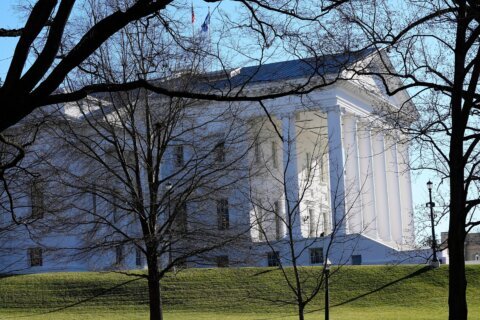Virginia Gov. Ralph Northam unveiled his outgoing state budget on Thursday in Richmond, highlighting major investments in education and behavioral health that he hopes will take place over the next two years.
Northam said the biennial 2022-2024 budget takes advantage of a healthy surplus in state revenues — $2.6 billion, the largest in Virginia’s history — that have been brought in thanks to sound money management over his term, which affords the commonwealth greater leniency to both invest and stow some of its cash.
“We’ve made targeted investments for the future, helped people get through the pandemic, and put money aside as a buffer for the future. This is possible because of strong, steady fiscal stewardship,” Northam told the various money committees in Richmond.
Investments
Most prominent in the outgoing governor’s proposed budget is a plan to raise teacher pay by 10%, which is broken down into 5% raises over the next two years. This was one of the hinted-at features of the budget in Northam’s “Thank You, Virginia” tour.
Other investments in education include $500 for localities to upgrade their facilities; nearly $270 million to support at-risk students; expanded funding for Virginia’s preschoolers by putting $73 million into the Child Care Development Fund; and more than $77 million in the early reading initiative over the next two years.
Historically Black Colleges and Universities will receive nearly $300 million for capital improvements, student support and other needs, while Tuition Assistance Grants for private school students will be raised to $5,000 per student over the next two years.
Along with that, Northam is proposing $150 million toward undergraduate financial assistance and $38 million in additional investments in the G3 program that provides free community college to low- and middle-income students who pursue jobs in high-demand fields.
More than $560 million is dedicated to addressing behavioral health priorities in the state, according to Northam’s proposed budget.
The bulk of that will be $263 million in funding community-based services to individuals with behavioral health needs, which include expanding permanent supportive housing, fully funding STEP VA services on community service boards and enhancing crisis services.
Nearly $165 million is going toward raises in direct care staff at state hospitals and training centers, with an additional $75 million proposed for boosting new behavioral health care standards and increasing the number of health care counselors in jails and the state’s Department of Corrections.
Northam also wants to see $675 million go toward greater eligibility of Medicaid waiver services. He said that the language of this part of the proposed budget would revise rates to providers for the first time since 2016 and would add 1,200 new waiver slots to the program.
Major investments in attracting commercial clients to the state will come in the form of $150 million mid-size and “megasites” that can accommodate manufacturing jobs. Northam also proposed adding $70 million to the Virginia Housing Trust Fund in the first year of his budget, with an additional $120 million in the second year.
“Strong revenue years, like this one, are the right time to make strategic, long-term
investments,” Northam said. “That’s true whether the investment is in asphalt and concrete, or the people who truly make up this state government.”
Other notable investments include:
- $42.5 million in payments per year under an agreement with Amazon, contingent on the company meeting its promises on investments and job creation.
- $60 million in upgrades to the state government’s cybersecurity infrastructure.
- 10% raise for all state employees, broken down into two 5% raises over the next two years.
- More than $220 million in funding to increase pay for state troopers, correctional officers, deputy sheriffs and regional jail officers.
- $410 million in land and water conservation efforts, as well as $245 million to help fund multi-use trails and the state’s parks.
- $27 million to establish the Center for Firearm Violence and Intervention and Prevention to collect data and publish reports on gun violence.
- The state will hold onto $424 million of the federal aid dollars it has received throughout the course of the pandemic to use going forward.
- Paying nearly $1 billion down on the Virginia Retirement System to reduce unfunded liabilities and make sure the state can meet its retirement obligations for thousands of state employees.
Tax cuts
Northam cited the state’s financial health as the reason why he could make good on some long-term promises to cut various taxes in the state.
That has included eliminating the state’s portion of the sales tax on groceries, which he said was a part of his campaign for governor in 2017. Since Virginia was on a credit watch in 2018, the cut wasn’t possible. Now, he wants to cut the state’s 1.5% portion of the grocery tax, which still preserves local revenues.
Northam also wants to make up to 15% of the federal earned income tax credit refundable for eligible families, particularly low- and middle-income families.
“In 2018, I also proposed giving working families a tax cut,” Northam said. “The federal government had made tax changes to help wealthy people, but it did little for everyone else. I wanted to make sure everyday Virginians benefited too, so we proposed making Virginia’s earned income tax credit refundable.
The governor again wants to offer one-time tax rebates for everyone who files income taxes in the state.
The rebates would be $250 for individual filers and $500 for married couples. In 2019, when the rebate was last offered, the state delivered rebates of $110 for individuals and $220 for married couples.
Ending the practice where retailers are asked to pay sales taxes before any revenue has been collected is another tax Northam is looking to eliminate.
You can watch the governor’s address to the Joint Meeting of the House Appropriations, House Finance and Senate Finance and Appropriations committees by visiting this link.








